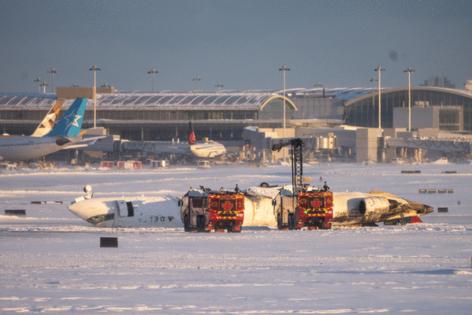Flight attendant first employee to sue Delta over crash landing in Toronto
Published in News & Features
MINNEAPOLIS — An airline employee on the flight that departed the Twin Cities and crashed on a Toronto runway in February is suing her employer, claiming the piloting crew that day was inexperienced and negligent.
Detroit resident Vanessa Miles is a flight attendant with Endeavor Air, the subsidiary of Atlanta-based Delta Air Lines operating the flight. She was commuting though not on active duty, known as “deadheading,” on Flight 4819 on Feb. 17 when the airplane descended too quickly and broke part of its landing gear, causing the regional passenger jet to roll over and skid down the snowy runway.
In her lawsuit, Miles alleges Delta and Endeavor “cut corners on safety” and rush pilots through training courses. She also accuses her employer of failing to maintain equipment or properly train crewmembers on emergency evacuations.
None of the 76 passengers or four on-duty crewmembers were killed in the fiery wreck after it departed Minneapolis-St. Paul International Airport. In all, 21 people were injured, including two who were seriously hurt. While dozens of regular passengers on the flight have sued the airline, Miles’ lawsuit is the first from an airline employee.
A Delta spokesman said this week the airlines remain engaged in the official crash investigation led by Canadian authorities at the Transportation Safety Board of Canada (TSB).
The airline declined to comment on the pending lawsuits and ongoing investigation. Delta previously pushed back on what it said were falsehoods about training failures of the captain and first officer, saying both were qualified and certified by the Federal Aviation Administration.
The airplane touched down and quickly buckled to its right side. The right wing hit the ground, sheared off and sprayed a cloud of jet fuel that soon caught fire.
The body of the aircraft wound up inverted on the runway at Toronto Pearson International Airport.
Authorities have said most of the 21 people hurt in the crash suffered sprains, head injuries, headaches and anxiety, as well as nausea from jet fuel exposure. Afterward Delta offered each passenger $30,000 in “no strings attached” assistance.
The crash rendered Miles temporarily unconscious, according to the federal lawsuit she filed last week in Michigan. She said she woke up to find herself “soaked” in jet fuel and surrounded by smoke.
After unbuckling her seatbelt, Miles fell to the ground. The flight crew failed to warn passengers that the emergency slides had not properly deployed, according to Miles’ lawsuit, and she fell about 6 or 7 feet because the slide did not work.
Miles said “the aircraft exploded” in flames about two minutes after she escaped.
Miles’ injuries included a broken left shoulder and a concussion. She also suffers from anxiety, depression and post-traumatic stress disorder as a result of the crash, according to her lawsuit.
Her lawyer did return requests for comment; Delta did not respond to questions about the status of Miles’ employment.
Miles is among at least two dozen other passengers who have filed lawsuits against Delta, claiming injuries and psychological distress, in the almost six months since the crash. Most of the passengers and the flight crew reside in Minnesota.
Attorneys expect more personal injury lawsuits to come in the two-year window passengers have to bring legal action.
A federal judicial panel last week heard legal arguments to consolidate the civil lawsuits arising from the crash. Attorneys representing both Delta and a majority of the plaintiffs suing the airline jointly asked the panel to pool the cases in Minnesota, as a way to save on costs and streamline the legal process.
A preliminary report from the TSB offered no specific reason why the plane descended so quickly. Such investigations typically span months or years and cite several contributing factors. Aviation experts have said the airplane landed hard on the runway before the landing gear broke.
According to the report, the Bombardier CRJ-900 flown by the first officer continued to descend at a high rate in the moments before and up until touchdown, triggering the airplane’s enhanced ground proximity warning system, which is designed to alert pilots to potential hazards on approach.
Delta has defended its crew, saying the first officer completed her flight training in April after being hired in January 2024 and has flown for Endeavor since then, exceeding the mandatory federal minimum standards. The captain, hired in October 2007, has worked as duty captain and in pilot training and flight safety roles.
Before the crash, the first officer had more than 1,422 hours of total flight time experience, nearly 419 of them spent on the CRJ-900, the most common plane in Endeavor’s fleet. She was on the fifth day of a five-day work cycle, according to the report, and started her day flying from Cleveland, Ohio, to Minneapolis-St. Paul International Airport.
She conducted three round-trip flights at Toronto Pearson in the 30 days before the crash.
----------
©2025 The Minnesota Star Tribune. Visit at startribune.com. Distributed by Tribune Content Agency, LLC.







Comments